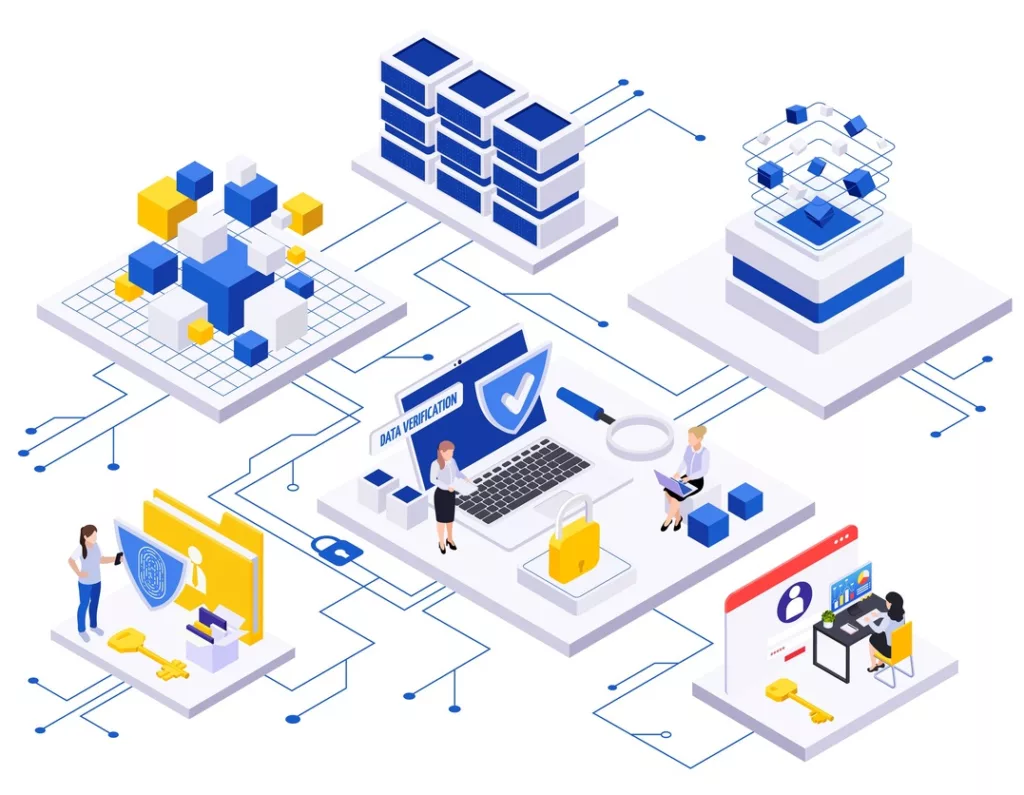Blockchain technology has rapidly transformed the way industries operate, extending far beyond cryptocurrency. While its connection to digital currencies is well-known, blockchain has matured into a revolutionary tool with the potential to reshape various industries. In this article, we will explore the applications of blockchain beyond cryptocurrency, showcasing how it’s disrupting traditional industries, addressing real-world problems, and providing innovative solutions.
Table of Contents
Definition and Overview of Blockchain
Blockchain is a decentralized and distributed digital ledger technology that records transactions across multiple systems. This technology ensures transparency, security, and immutability in data handling, allowing all participants in the network to verify transactions without the need for a central authority. In essence, blockchain removes the “middleman,” facilitating peer-to-peer transactions, making it a highly efficient and secure technology.
The core features of blockchain—transparency, decentralization, and security—make it a suitable solution for industries that need to protect sensitive data, reduce fraud, and streamline processes.

15 Applications of Blockchain Beyond Cryptocurrency
Blockchain’s potential far exceeds its use in cryptocurrency. Below, we explore 15 blockchain business applications that demonstrate its versatility.
1. Supply Chain Management
Blockchain’s transparency makes it ideal for tracking the entire journey of products. From raw materials to finished goods, blockchain provides verifiable records, reducing fraud and increasing trust. Major companies like IBM and Walmart are already leveraging this technology to enhance visibility in their supply chains.
Key Features:
- Full transparency and traceability
- Reduced inefficiencies and fraud
- Enhanced consumer trust
Cons:
- Requires industry-wide adoption for maximum impact
- Can be costly to implement initially
2. Healthcare
In healthcare, blockchain business applications include the secure handling of patient data and streamlining data-sharing between medical institutions. Blockchain enhances privacy and reduces medical fraud by ensuring that records are tamper-proof.
Key Features:
- Enhanced data security and privacy
- Streamlined sharing of medical records
- Reduced errors in patient information
Cons:
- Lack of standardization across healthcare providers
- Data entry errors remain a risk
3. Voting Systems
Blockchain can revolutionize voting by creating a transparent, tamper-proof system. Voter fraud and electoral manipulation could be nearly impossible, to ensure fair and free elections.
Key Features:
- Immutable record of votes
- Increased voter confidence
- Instant results verification
Cons:
- Regulatory challenges
- High reliance on technology infrastructure
4. Intellectual Property Protection
Blockchain allows creators to store proof of ownership for digital assets like music, art, or literature. Artists can track the usage of their work, ensuring that they are compensated properly.
Key Features:
- Immutable ownership records
- Streamlined licensing
- Reduced piracy
Cons:
- Adoption by creative industries is slow
- May not fully prevent unauthorized sharing
5. Real Estate Transactions
Blockchain can simplify real estate transactions by reducing paperwork, enhancing transparency, and expediting processes. Blockchain records can ensure clarity in property ownership, simplifying the buying and selling process.
Key Features:
- Faster and cheaper transactions
- Secure title records
- Reduced fraud in property sales
Cons:
- Adoption varies widely across regions
- Regulatory hurdles
6. Digital Identity Verification
Blockchain can provide individuals with secure digital identities that are verifiable and tamper-proof, protecting personal data in online interactions and reducing identity theft risks.
Key Features:
- Secure identity management
- Reduced identity fraud
- Universal access across different platforms
Cons:
- Potential privacy concerns
- Implementation complexity across jurisdictions
7. Cross-Border Payments
Beyond cryptocurrency, blockchain can streamline cross-border payments by eliminating intermediaries and reducing transaction fees. It ensures faster, more transparent international money transfers.
Key Features:
- Low transaction fees
- Instant cross-border payments
- High transparency
Cons:
- Limited adoption by financial institutions
- Regulatory issues
8. Insurance Industry
Blockchain can transform the insurance industry by providing transparency in claims processing, verifying the legitimacy of claims, and automating payments via smart contracts.
Key Features:
- Improved fraud detection
- Faster claims processing
- Automated payments through smart contracts
Cons:
- Implementation challenges
- Standardization across the industry is required
9. Education and Credential Verification
Blockchain can be used to securely store educational records and qualifications, making credential verification faster and more reliable for both employers and institutions.
Key Features:
- Instant verification of credentials
- Secure storage of academic records
- Reduces resume fraud
Cons:
- Limited adoption
- Data standardization issues
10. Energy Trading
Blockchain can facilitate peer-to-peer energy trading, allowing consumers to buy and sell excess energy directly from one another, leading to a more efficient energy market.
Key Features:
- Decentralized energy trading
- Reduced energy waste
- Transparent pricing
Cons:
- Complex implementation
- Requires smart grid infrastructure
11. Food Safety
Blockchain ensures traceability from farm to table, improving food safety by tracking every step in the food supply chain. This technology helps pinpoint sources of contamination during food recalls.
Key Features:
- Full traceability of food products
- Faster recalls in case of contamination
- Increased consumer confidence in food safety
Cons:
- High implementation costs for smaller companies
- Dependent on data accuracy
12. Charity and Donations
Blockchain allows donors to track their donations in real-time, ensuring transparency in how funds are used, which can increase trust in charitable organizations.
Key Features:
- Transparent use of donations
- Instant transfer of funds
- Reduced fraud
Cons:
- Requires adoption by charities
- Regulatory oversight needed
13. Blockchain in Trade Finance
One of the more compelling blockchain business applications is in trade finance. By automating document verification, reducing fraud, and expediting transactions, blockchain can streamline the global trade process.
Key Features:
- Reduced paperwork
- Faster verification and payments
- Fraud prevention
Cons:
- Adoption is slow among traditional players
- Legal hurdles in international trade
14. Retail and E-Commerce
Blockchain can provide transparency in product authenticity, especially for luxury goods. By offering digital certificates of authenticity, it reduces the risk of counterfeit goods entering the market.
Key Features:
- Verifiable product authenticity
- Increased consumer confidence
- Enhanced supply chain transparency
Cons:
- Costly for smaller retailers to implement
- Dependent on consumer adoption
15. Government Services
Blockchain has the potential to modernize various government services, including land registry, tax collection, and welfare distribution, by enhancing transparency and reducing corruption.
Key Features:
- Streamlined government services
- Reduced corruption and fraud
- Transparent records
Cons:
- Implementation challenges
- Potential resistance from bureaucratic institutions

Brands That Help Define Use Cases for Blockchain Technology
Several leading companies have embraced blockchain technology to solve complex problems and improve operations. These brands are pioneering blockchain business applications beyond cryptocurrency, showcasing its potential across industries.
- IBM: Blockchain for Food Safety
IBM’s Food Trust blockchain has transformed the global food supply chain by providing transparency and accountability. It allows stakeholders—farmers, processors, and retailers—to share and access real-time data about food products. This has significantly reduced the time needed to trace the origin of contaminated items. For example, Walmart, a major partner in IBM’s network, reduced the time to trace mangoes from six days to just 2.2 seconds, improving food safety and minimizing waste.
- Walmart: Food Traceability
Walmart leverages blockchain to track the origins of its food products, ensuring faster and more accurate food recalls. By mandating that suppliers of leafy greens use blockchain, Walmart has enhanced traceability and transparency, reducing the risk of foodborne illness outbreaks. This technology enables Walmart to swiftly identify and remove contaminated products, minimizing waste and protecting consumers.
- Maersk: Revolutionizing Global Shipping with TradeLens
Maersk, in collaboration with IBM, developed TradeLens, a blockchain-based platform aimed at digitizing global shipping documentation. TradeLens eliminates paper-based processes, reducing delays and fraud. The platform streamlines international trade by providing real-time access to shipping data for all participants, including exporters, customs authorities, and ports. This transparency accelerates processing times, reduces costs, and increases security in global trade.
These brands, along with others like Amazon and Microsoft, are pioneering how blockchain is being used today, demonstrating its transformative potential across industries from food safety to global shipping.
Challenges and Limitations of Blockchain Technology
Despite its revolutionary potential, blockchain faces several challenges:
1. Scalability
One of the primary limitations of blockchain, particularly in public networks like Bitcoin or Ethereum, is scalability. As more participants join the network, the number of transactions that need to be validated increases, which can result in slower transaction speeds. Blockchain’s distributed nature means every node in the network must validate and store every transaction, leading to network congestion. For instance, Bitcoin can only handle around 7 transactions per second, compared to traditional payment systems like Visa, which can process thousands of transactions per second. Solving scalability issues remains a major focus of blockchain developers, with solutions such as sharding and layer-2 protocols being explored.
2. Energy Consumption
Another significant challenge is the high energy consumption of blockchain, particularly those using the Proof of Work (PoW) consensus mechanism. Mining cryptocurrencies like Bitcoin requires vast amounts of computational power, resulting in immense energy use. This has raised environmental concerns, especially as global efforts to reduce carbon footprints intensify. Some blockchain platforms, like Ethereum, are moving toward more energy-efficient consensus mechanisms, such as Proof of Stake (PoS), but this transition is still in progress for many networks.
3. Regulatory Uncertainty
The lack of clear regulations around blockchain and its applications poses a considerable barrier to adoption. Governments worldwide are still grappling with how to regulate decentralized systems, especially in industries like finance and healthcare. The ambiguity creates uncertainty for businesses looking to invest in blockchain solutions, as they may face future legal challenges or compliance issues. Furthermore, differing regulations across regions can complicate the implementation of global blockchain systems, as companies must navigate a patchwork of rules.
4. Cost of Implementation
Implementing blockchain technology can be expensive and complex, particularly for small to medium-sized businesses. Developing a blockchain infrastructure requires specialized expertise, which can be costly to hire or outsource. Additionally, integrating blockchain with existing systems can be a time-consuming process, requiring significant investment in both technology and employee training. As a result, many smaller organizations are hesitant to adopt blockchain until the technology becomes more affordable and accessible.
Predictions for Blockchain Adoption Across Industries
Blockchain’s adoption across industries will continue to grow as more use cases emerge and technology matures. The financial sector is expected to remain the primary adopter, but healthcare, supply chain management, and trade finance are also poised for significant blockchain integration. Governments and regulatory bodies will need to provide clearer guidance, which will further drive adoption across various sectors.
Frequently Asked Questions
What is blockchain beyond cryptocurrency?
Blockchain is a decentralized digital ledger technology that facilitates secure, transparent, and tamper-proof transactions across various industries beyond cryptocurrency.
How is blockchain being used today?
Blockchain is being used in supply chain management, healthcare, real estate, trade finance, and digital identity verification, among other sectors.
What are the challenges of blockchain adoption?
Scalability, energy consumption, regulatory hurdles, and the cost of implementation are significant challenges hindering widespread blockchain adoption.
Conclusion
Blockchain is no longer just synonymous with cryptocurrency. Its versatility has allowed it to penetrate numerous industries, transforming the way businesses operate. As adoption continues to grow, the technology will become more accessible and integral to business processes.
If you’re considering integrating blockchain into your business, Vinova offers tailored solutions to help you navigate the complexities of blockchain technology, ensuring that you leverage its full potential for your organization.